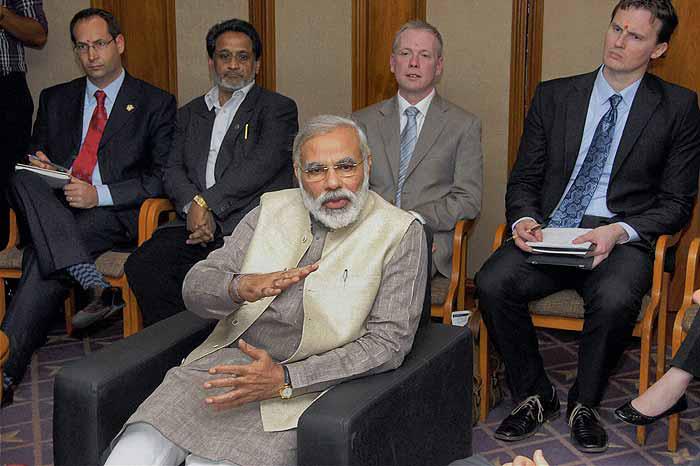Is Narendra Modi THE guy who can ‘fix’ it?
The general perception in the country is that due to its imprudent fiscal policy, the UPA has driven our economy to the ground. While it would be fair to say that the central government could have done a better job, one should avoid getting carried away while judging them. In order to better understand their performance we need to be cognizant of the fact that the UPA has battled a once-in-lifetime near-depression, for almost half of its tenure. And,to get a more holistic picture we need to compare India’s performance with the rest of the world, during the same period. Once we do that, it becomes quite obvious that while things could have been better, they could have very easily been worse.
During his speeches, Narendra Modi often claims that once he becomes the Prime Minister of the country, he would revive the economy that has been severely ‘mismanaged’ by Dr Manmohan Singh and P Chidambaram. The general elections are just a month away and Modi is yet to share his detailed economic plan with us, highlighting how exactly he plans to ‘fix’ the economy (which according to many economists is still fundamentally strong).
After assessing Modi’s performance in managing the finances of his state, I for one am not inclined to believe that he is in possession of a panacea, which could cure anything and everything. (Read: Arvind Kejriwal is right. Narendra Modi’s Gujarat growth story is the biggest public relations con-job of our time)
As on March 2012, Gujarat’s debt was Rs 138,978 cr (projected to reach Rs 176,000 cr in 2013–14), only West Bengal (Rs 192,000 cr) and Uttar Pradesh (Rs 158,000 cr) have a higher debt than Gujarat. The state’s debt when divided among its six crore populace gives a per capita debt of approximately Rs 23,000, the highest among all major states. What is interesting to note is the fact that Gujarat’s debt has increased by more than three times since Modi became chief minister, it was Rs 45,301 cr in 2001–02.
Economists would tell us that high debt on its own may not be a bad thing; several good companies are highly leveraged because they borrow money to invest and create capital assets which in turn contribute to higher revenue. But, in case of Gujarat, a lot of spending has been done on ‘showpiece’ infrastructure projects – while spending on key sectors (such as health and education) has been low.
According to the CAG report on state finances (for the year ending March 2011), the average return on state government’s investments in statutory corporations, rural banks, joint stock companies and co-operatives was 0.25 per cent in the last three years; while the government paid an average 7.67 per cent as interest on its borrowings during 2008–09 to 2010–11.
The CAG report also talks about the poor debt management of the Gujarat government; the state has incurred 41% higher debt than the last financial year and burdened the exchequer with heavy interest liability at a higher rate.The report criticizes the entire state government, but, it is particularly harsh on the finance and public sectors – which are found to be the least efficient.
The financial woes of the state government are further highlighted by their stance on the seventh pay commission. Gujarat is one of the only two states (the other being West Bengal) that have expressed discomfort over implementing the seventh pay commission.The state government has stated that the seventh pay commission would lead to an unsolicited financial strain on the state, which they cannot afford.
When the finances of the state, where Narendra Modi has been the chief minister for the past 12 years, are in dire straits; wouldn’t it be foolish on our part, to expect him to have a magic wand that can ‘fix’ the country’s economy. (Courtesy: india.com)
(Asbah Farooqui, works for a multinational firm that provides research and consulting services. He tweets at @asbah1)






















